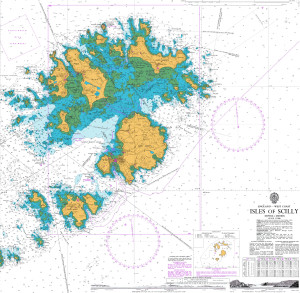Micropatrology
Micropatrology
Micropatrology or the study of small countries is quite peripheral to the subject of Atlantis, but it is a curious fact that a number of the attempts to establish new independent states have their titles inspired by the name of Plato’s lost island. They include Atland, Atlantis, and the Principality of Atlantis & Lemuria. There was even an attempt by Leicester Hemingway, the younger brother of the famous author, to have New Atlantis established and recognised internationally(a). Its ‘territory’ just consisted of a thirty-foot barge off the coast of Jamaica and had as its primary objective the generation of revenue through the issuing of postage stamps.
The Madeira archipelago (a minor Atlantis candidate) in the Atlantic includes the tiny independent Principality of Pontinha(e), which today has bitcoin as its official currency!
Arguably one of the most attractive micronations is the Republic of Uzupis, which occupies less than one sq.km of Vilnius the capital of Lithuania(f). The Republic of Le Saugeais, sandwiched between France and Switzerland is also popular with tourists(g)
In East Germany, we have “Königreich Deutschland” (Kingdom of Germany) ruled by Peter the First (Peter Fitzek)(j).
Coins have been issued in the name of a non-existent ‘Kingdom of Atlantis’, by the World Proof Numismatic Association(h), which is a one-man show owned by Edward J. Moschetti.
One of the more ambitious creations is the Empire of Atlantium(b)(c), established in 1981 by three Australians when they declared their independence from the Commonwealth of Australia and proclaimed George Francis Cruickshank as its ruler with the title of His Imperial Majesty George II. Understandably, I worry about the fate of George I! Australia has a number of other micronations as recently reported by the BBC(d).
Places That Don’t Belong is a fascinating “BBC Travel series that delves into the playful side of geography, taking you through the history and identity of geo-political anomalies and places along the way”(i).
There are currently (March 2023) five micronations within the United States(k), none of which claim any association with Atlantis(k).
>>I was not really surprised that one of the more recent claims related to Antarctica, where Grand Duke Travis rules over Westarctica(l).<<
This strange subject is discussed in a book by Erwin S. Strauss [482] and additional information can be obtained from the International Micropatrological Society, 4554 McPherson Ave., Saint Louis, Missouri, 63108.
(b) See: https://web.archive.org/web/20191123080317/https://www.atlantium.org/
(c) https://en.wikipedia.org/wiki/Empire_of_Atlantium
(d) https://www.bbc.com/news/world-australia-38964465
(e) See: https://web.archive.org/web/20170905084632/https://principality-pontinha.com/index.html
(f) https://www.bbc.com/travel/story/20181014-uupis-a-tiny-republic-of-free-spirits
(g) https://www.bbc.com/travel/story/20200311-a-tiny-country-between-france-and-switzerland
(h) Kingdom of Atlantis Coin, Ruler and brief History (archive.org)
(i) Places That Don’t Belong – BBC Travel
(j) The self-proclaimed kingdom that doesn’t recognise Germany – BBC News
(k) The kingdom in my backyard: 5 micronations within the United States (msn.com)
(l) Westarctica: The micronation with a real-world purpose – Big Think *
Lyonesse
Lyonesse is a mythical land between Cornwall and the Scilly Isles that reputedly sank into the sea. Ancient maps indicate that most of the Scillies were united in Roman times(a) noted by Peter Stanier in his book[0997] about the region. Legend has it that it contained 140 temples. Mordred is said to have fought his final battle with King Arthur at Lyonesse. This ancient tale has been regularly linked with the destruction of Atlantis.
There is a parallel Breton legend of Kêr-Is (Ker-Ys in French).
A group of rocks called the “Seven Sisters” lies six miles (10 km) off Land’s End, the southernmost tip of Britain. According to legend, these rocks mark the site of a kingdom that once linked Britain to France. The site description fits in with the Cornish myth of the kingdom of Lyonesse – also known as the City of Lions. In the 5th century A.D., Lyonesse was inundated and disappeared beneath the sea. The legend has it that there was only one survivor. Since then, local fishers have caught pieces of buildings and other remains in their nets. They claim that these come from Lyonesse.
Henry Beckles Willson in a 1902 booklet[1427] claimed that land now lost, once extended from Land’s End to the Scilly Isles. Contrast that with a speculative map in Lucile Taylor Hansen’s book The Ancient Atlantic[572], which shows Lyonesse as a large landmass west of the Scillies. She also informed us that the island of Tresco, which today is roughly 2 miles long and a mile across at its widest, had a circumference of ten miles in 1538.
A team of Russian scientists were hoping to answer the two and a half thousand-year-old mystery regarding Plato’s Atlantis, with an investigation of the underwater ‘Celtic Shelf’ beyond the Scilly Isles. Viatcheslav Koudriavtsev, of the Moscow Institute of Meta-history, has used a re-interpretation of the classical Greek texts to locate the possible position of the fabled ancient lands. It is claimed that in the 1990s the British authorities were set to issue a six-week licence for the exploration of Little Sole Bank, a conical submerged hill lying only 50m below the surface approximately 100 miles south-west of the mainland, but apparently, due to a lack of funding, nothing has been heard of the project since.
>Paul Dunbavin offers a valuable overview of the history and mythology relating to the story of Lyonesse on his website(d) and in Prehistory Papers [1758].<
In 2012 the ‘micronation’ self-styled as the Principality of Lyonesse declared its ‘independence’(b)(c).
Also see: Micropatrology
(a) https://simple.wikipedia.org/wiki/Isles_of_Scilly
(b) https://lyonesse.weebly.com/
(c) https://shimajournal.org/issues/v10n2/k.-Hallerton-Shima-v10n2.pdf
>(d) Lyonesse – Lost | Paul Dunbavin (third-millennium.co.uk)<
